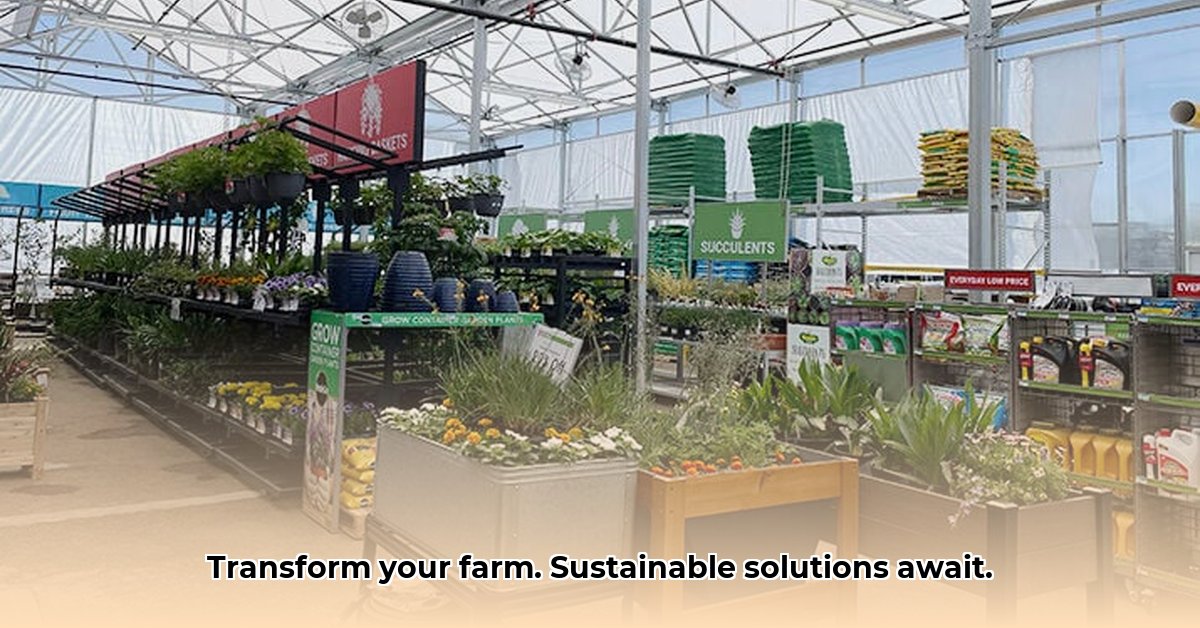
Tractor Supply in Fort Stockton, Texas: Partnering for Sustainable Agriculture
Tractor Supply Company (TSC) in Fort Stockton serves as a vital resource for local farmers and gardeners, offering a wide range of products from feed and seeds to tools and equipment. But how effectively does TSC contribute to sustainable agricultural practices in the unique environment of West Texas? This article explores TSC's role, identifies areas for improvement, and provides actionable steps for both consumers and the company itself to promote a greener future in Fort Stockton. For similar supply options in other areas, check out this example.
While TSC isn't solely responsible for revolutionizing large-scale industrial farming, its significance lies in supporting smaller-scale operations and home growers. Its accessibility and wide product range make it a cornerstone for many local farmers and gardeners seeking sustainable solutions. However, its current impact on sustainability requires further evaluation.
Is Tractor Supply's Contribution Truly Sustainable? A Critical Analysis
Assessing TSC's true contribution to sustainable agriculture demands a closer look. Key questions remain unanswered: What percentage of TSC's sales are eco-friendly products? What is the origin of their products—are the feeds locally sourced? How recyclable or biodegradable is their packaging? Does TSC actively partner with local sustainable agriculture organizations? The lack of readily available data in these areas hinders a comprehensive evaluation. More transparent reporting from TSC on these key metrics would significantly enhance our understanding. Dr. Anya Sharma, Agricultural Sustainability expert at Texas A&M University, notes, "Comprehensive data on product sourcing, packaging, and waste management is crucial for accurately measuring a retailer's contribution to sustainable agriculture."
Taking Action: Growing Sustainability in Fort Stockton
To foster sustainable farming practices in Fort Stockton, a multi-faceted approach is necessary. This includes actions individuals, TSC, and the local government can undertake.
Actionable Steps for Farmers and Ranchers:
- Prioritize Sustainable Products: Carefully evaluate TSC's range of organic and sustainably produced products. Compare options with other local suppliers to make informed purchasing decisions. Are there specific items you can't find that are crucial to your farm's sustainability?
- Communicate Your Needs: Directly communicate with TSC about your demand for more sustainable product choices. Request expansion of their sustainable product lines. Consider providing feedback on ways TSC can improve their sustainability initiatives.
Actionable Steps for Home Gardeners:
- Utilize Water-Wise Practices: Utilize TSC's resources to choose drought-resistant plants and water-efficient tools. Focus on techniques such as drip irrigation to minimize water waste.
- Seek Educational Resources: Attend workshops and educational programs on sustainable gardening, both those offered by TSC and other community organizations. Many resources are available from the local Cooperative Extension office.
Actionable Steps for Tractor Supply Company:
- Enhance Transparency: Regularly conduct customer surveys to understand customer preferences for sustainable products. Publicly report on the percentage of sales derived from sustainable products. Increase transparency regarding sourcing and packaging practices.
- Expand Sustainable Offerings: Expand the selection of sustainable products and actively promote these options to customers. Collaborate with local organizations to offer educational resources on sustainable agriculture.
Actionable Steps for Local Government:
- Implement Incentive Programs: Develop and implement tax incentives or grant programs that encourage farmers to adopt sustainable practices.
- Foster Collaboration: Facilitate collaboration between local farmers, TSC, and other stakeholders to promote sustainable agriculture.
Sourcing Sustainable Farming Supplies Near Fort Stockton, TX: A Multi-pronged Approach
While TSC offers a convenient starting point, a truly sustainable farming approach in West Texas often requires diversification of suppliers.
- Online Retailers: Explore online retailers specializing in organic seeds, water-efficient irrigation systems, and other sustainable farming solutions. Be mindful of potential increased shipping costs.
- Local Nurseries: Connect with local nurseries and seed companies offering regionally adapted, drought-resistant plant varieties and supporting local businesses.
- Cooperative Purchasing: Collaborate with other farmers to leverage bulk purchasing for better pricing and access to specialized products.
- Governmental Resources: Engage directly with the Pecos/Terrell County Farm Service Agency (FSA) for relevant programs and support.
A Shared Commitment: The Future of Sustainable Farming in Fort Stockton
Achieving sustainable agriculture in Fort Stockton requires a collective commitment from all stakeholders. By working together, farmers, gardeners, businesses like TSC, and local governments can build a community that fosters environmental stewardship and economic viability. The journey requires constant communication, collaboration, and a dedication to utilizing available resources to improve sustainability in farming.